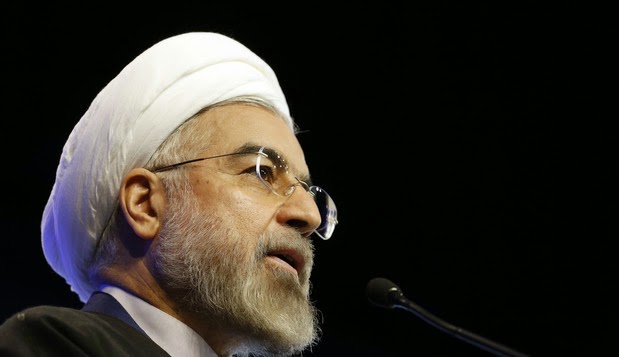More Bad Omens for the Iran Nuclear Talks-By Jeffrey Goldberg
 |
No, you may not destroy any of my centrifuges.
|
More Bad Omens for the Iran
Nuclear Talks
ByJeffrey Goldberg Jan 25, 2014 12:03 AM GMT+0200
The velocity of
bad sign-spotting is increasing as we get closer to the main negotiations over
Iran's nuclear program.
Bad Sign No. 1: I think it’s important to
note that Iranian President Hassan Rouhani has just stated that under no
circumstances would Iran agree to destroy any of its centrifuges. I would also
like to note that this unequivocal statement, if sincere, means that there is
no possibility of a nuclear deal between Iran and the six powers set to resume
negotiating with it next month.
In order to keep Iran perpetually 6 to 12 months away from
developing a nuclear weapon -- an unacceptable period in the mind of Israeli
Prime Minister Benjamin Netanyahu, but a time-frame that U.S. President Barack
Obama could conceivably accept -- Iran would have to agree to dismantle 15,000
centrifuges; close an important uranium enrichment site; and accept 20 years of
nuclear inspections, according to the Institute for Science and International Security, a
well-respected (and centrist) think tank headed by the former United Nations
weapons inspector David Albright.
Here is what Rouhani -- who is described as a far more moderate
a figure than the man who actually leads Iran, Supreme Leader Ayatollah Ali
Khamenei -- said on CNN: “In the context of nuclear technology,
particularly of research and development and peaceful nuclear technology, we
will not accept any limitations. And in accordance with the parliament law, in
the future, we’re going to need 20,000 megawatts of nuclear-produced
electricity, and we’re determined to obtain the nuclear fuel for the nuclear
installation at the hands of our Iranian scientists. And we are going to follow
on this path." At which point, his interviewer, Fareed Zakaria, asks: “So
there would be no destruction of centrifuges, of existing centrifuges?” To
which Rouhani responds: “Not under any circumstances. Not under any
circumstances.”
I’m not sure how Rouhani and his chief negotiator, the suave,
superficially Westernized foreign minister Mohammad Javad Zarif, back down from
this maximalist position. And I’m not sure how Obama could possibly accept a
deal that mothballs centrifuges while leaving them in place, rather than
devising an agreement that guarantees their destruction. If the centrifuges are
allowed to remain in Iran, but are disabled (or covered with bedsheets or
wrapped in couch-plastic or locked in a very big room), it would possible for
Iran to very quickly start spinning them again. First step: Kick out the
inspectors. Second step: Break the locks. Third step: Enrich uranium to
weapons-grade level in a short enough period that the West -- the lumbering,
ambivalent, disputatious West -- has insufficient time to respond.
This would be the moment, of course, at which Obama would have
to carry out his promise to use whatever means necessary to stop Iran from
going nuclear, and this is not a position Obama wants to create for himself --
which is why leaving the centrifuges in place would not be a wise move for him.
Bad Sign No. 2: Zarif, the moderate’s
moderate, might not be so moderate at all. Writing in the
New Republic, Ali Alfoneh and Reuel Marc Gerecht plumb Zarif’s
new memoir, “Mr. Ambassador: A Conversation with Mohammad-Javad Zarif, Iran’s
Former Ambassador to the United Nations,” and find distressing signs of
ideological fervor: "His discussion of the basic nature of the Islamic
Republic and the West exposes Zarif’s ideological commitment and the regime’s
revolutionary constancy.”
They quote him: “ 'We have a fundamental problem with the West
and especially with America,’ Zarif declares. ‘This is because we are claimants
of a mission, which has a global dimension. It has nothing to do with the level
of our strength, and is related to the source of our raison d’etre. How come
Malaysia [an overwhelmingly Muslim country] doesn’t have similar problems?
Because Malaysia is not trying to change the international order. It may seek
independence and strength, but its definition of strength is the advancement of
its national welfare.’ ”
Alfoneh and Gerecht continue, “While Zarif considers national
welfare one of the goals of the Islamic Republic, he stresses that ‘we have
also defined a global vocation, both in the Constitution and in the ultimate
objectives of the Islamic revolution.' He adds: ‘I believe that we do not exist
without our revolutionary goals.’ ”
In other words, U.S. negotiators facing Zarif might be facing
someone who is more rigidly ideological than they are prepared to acknowledge.
Bad Sign No. 3: A new study by the Pentagon’s Defense Science
Board raises questions about the U.S. ability to detect nuclear activity in
countries that don’t want the U.S. to know about their nuclear activities. Iran
for many years maintained secret nuclear facilities and could conceivably be
maintaining undeclared nuclear facilities today. This study indirectly suggests
that U.S. intelligence would have difficulty making sure Iran adheres to a nuclear
accord.
Of course, Bad Sign No. 1 seems to mean that there will never be
a nuclear accord to monitor in the first place.
To contact the writer of this article: Jeffrey Goldberg at
jgoldberg50@bloomberg.net.
To contact the editor responsible for this article: Zara Kessler
at zkessler@bloomberg.net.


تعليقات